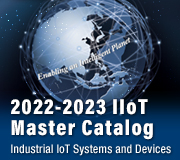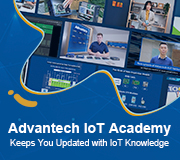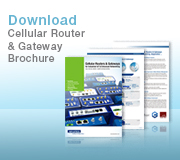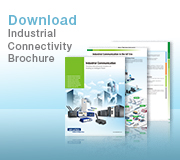-
Products
Embedded Computing
- AIoT Software, Distribution & Services
- Application Focus Embedded Solutions
- Arm-Based Computing Platforms
- Computer On Modules
- Digital Signage Players
- Edge AI & Intelligence Solutions
- Embedded PCs
- Embedded Single Board Computers
- Fanless Embedded Computers
- Gaming Platform Solutions
- Industrial Display Systems
- Industrial Flash & Memory Solutions
- Industrial Motherboards
- Industrial Wireless Solutions
- Wireless ePaper Display Solutions
Cloud, Networking & Servers
- Industrial, Telecom and Cloud Servers
- Network Interface & Acceleration Cards
- Network Security Appliances
- SD-WAN & uCPE Platforms
- WISE-STACK Private Cloud
Applied Computing (Design & Manufacturing Service)
Industrial Automation & I/O
- Automation Controllers & I/O
- Certified Solutions
- Class I, Division 2 Solution
- Data Acquisition (DAQ)
- Embedded Automation Computers
- Gateways & Remote Terminal Units (RTUs)
- Human Machine Interfaces
- Motion Control
- Panel PC
- Power & Energy
- Remote I/O
- WebAccess Software & Edge SRP
- Wireless I/O & Sensors
Intelligent Connectivity
- Cellular Routers and Gateways
- Ethernet / Serial Device Servers
- Industrial Ethernet Switches
- Industrial Media Converters
- Industrial Protocol Gateways
- Industrial Wireless and Gateways
- Intelligent Connectivity Software
- Serial / USB Communications
- Telematics Converters and Gateways
Computer Vision & Video Solution
- Advanced Video Appliances
- AI Jetson Platforms
- Intelligent Vision Camera & Software
- Video & Vision Cards
Intelligent Systems
-
Solutions
Solutions
- Services
-
Partners
Business Alliance Partner
- Support
- Corporate
- Contact
Visit the Advantech Global website, or choose your country or region below.
Africa & Middle East
MyAdvantech Registration
- Whitepaper
-
Keeping up with Industry Needs: Industrial Automation Devices Evolve to Meet IT, OT, and IoT Challenges
Advancements in Advantech remote I/O, I/O gateways, and controllers address changing industrial automation needs with innovations. -
RS-422 & RS-485 Applications eBook
A Practical Guide to Using RS-422 and RS-485 Serial Interfaces -
10 Questions to Ask Before Selecting an Ethernet Switch
There are some requirements to consider before narrowing your search for a switch that best suits your application. Following are helpful questions to ask at the beginning of the project. -
Why Security is Becoming More Important (2nd edition)
Increased connectivity means increased risk. When devices are all interconnected, they are more vulnerable to cyber attacks and unauthorized intrusions. Thus, with IIoT infrastructure becoming increasingly networked via Ethernet, Ethernet security has become a key issue for the modern world. -
What's the Protocol: Wireless Protocols to consider for your next Industrial Internet of Things (IIoT) Application
As the demand for data and analytics grows, manufacturers and users must face up to the realization that IIoT is happening today and should be ready to address the challenge. -
Why Security is Becoming More Important
In the IoT world, the number of devices being connected to networks is growing. However, there is a tradeoff that must be considered when seeking to connect everything together. In this case, the tradeoff is between connectivity and security. -
Power Supply Selection Tips and Calculation
Requirements to keep in mind when selecting a power supply -
IP Ratings Explained
The ’IP’ in IP codes, or sometimes called IP ratings, stands for ”Ingress Protection”. These codes rate the degree of protection that a housing offers from objects such as dust and water. These ratings are defined by the IEC 60529 Standard. The standard makes it possible to quantify the degree of protection instead of using a subjective terms -
Tips for Using Port Powered Converters
When using or installing any RS-232 port powered device, it is important to keep a few things in mind. The two main items are the Power Available from the RS- 232 port and the Power Dissipated by the RS-422 or RS-485 system. -
Automatic Serial Data Collection
There are multiple options for expanding the capability of a port that was designed to communicate with only one device. Using a Buffered Smart Switch, such as BB-232BSS4, is an excellent way to collect data from multiple devices by utilizing RS-232 serial ports. -
Media Conversion - LAN to MAN and Beyond
Media converters play an important role in today’s multiprotocol, mixed media Local Area Networks (LAN). For example, LAN administrators can deploy media converters to integrate fiber optic cabling and active equipment into existing copper-based, structured cabling systems while achieving significant cost-savings. -
12 Questions to Ask Before Selecting an Ethernet Network
Ethernet’s simple and effective design has made it a popular industrial networking solution at the physical and data link levels. With high-speed and high-bandwidth options and a variety of media types to choose from, Ethernet is efficient and flexible. -
Wireless Quick Tips
In some commercial and industrial data communications applications, hardwiring devices together is not practical. Long distances, inaccessibility and frequent relocation of devices are a few situations that can complicate applications. -
10 Tips to Remember About Industrial Ethernet
10 Tips to Remember About Industrial Ethernet -
The Emergence of Wireless Thinking Networks
Thinking networks will ultimately be able to deliver just about any data, just about anywhere and the transmission methods involved will be completely transparent to the end user, whether that end user is a machine or a human being. -
Make Tablets and Smart Phones Smarter
This article will review serial device server technology’s usefulness and drawbacks and demonstrate how to access serial data from locations that are either remote or restricted and, thus, out of range of a Wi-Fi network. -
Simple Wire Replacement - Tips and Fixes
These tips and tricks make it simple enough to take your wireless modems out of the box, plug in power and data lines and, voilà, your network is wireless. -
Converters for the Industrial Bus World
What is an industrial bus? Traditionally, the industrial bus has been used to allow a central computer to communicate with a field device. The central computer was a mainframe or a mini (PDP11) and the field device could be a discreet device such as a flow meter, temperature transmitter or a complex device such as a CNC cell or robot. -
Calculating Fiber Loss and Distance
Fiber optics has been providing long distance connections for a long time. But, until now, the higher cost often made it impractical in many LAN topologies. That is has been changing as the need for bandwidth rises and the price of fiber drops. -
Ethernet Basics Guide
Ethernet Basics Guide -
Ethernet Buzzword Guide
Ethernet has a zillion buzzwords, plenty of strange abbreviations, acronyms and “short hand”. For example, “10BASE-T” means 10 Megabits per second, baseband, twisted pair. This glossary is a collection of the most common terms that you encounter when working with Ethernet and networking, in general. -
Troubleshooting and RS-232 to RS-485 Interface Converter
detailed instructions on how to field test an RS-232 to RS-485 converter -
Baud Rate Resistor - 485TBLED - RS-232 to RS-485 Converter
how to change baud rate on BB-485TBLED -
Polarities for Differential Pair Signals
B+B SmartWorx labels the data lines on RS-422 and RS-485 with an “A” for negative or “B” for positive, to indicate the positive and negative relationship between the two data lines. It is important to label the data lines because this positive and negative relationship between the lines must be maintained when connecting one device to another. -
How Do I Make RS-485 or RS-422 Connections
How Do I Make RS-485 or RS-422 Connections to Models BB-4WSD9OTB & BB-4WSD25OTB? -
Wireless Antenna Installation Guide
10 Tips for Making Your Wireless Installation a Success -
High Retention USB Ports
Grip standard USB cables securely. B+B SmartWorx designs high-retention USB port connectors into many of its USB products – ideal for commercial and industrial applications. -
10 Tips to Remember About USB
How to incorporate all the perks of USB into your system. Universal Serial Bus is the answer to combining newer PCs and technologies with tried and true legacy devices. -
Tech Tip: Airborne Product Series - Using EAP with LDAP
How to configure Airborne series modules using PEAP and TLS to authenticate with a Windows NPS server that syncs with LDAP. -
Configuring Mixed Voltage and 4-20mA Inputs - Wzzard Analog Input Node
How to connect both voltage and milliamp sensors to a Wzzard Analog Node. -
RS-485 Troubleshooting Guide
You can avoid many pitfalls and save troubleshooting by paying attention to some fundamentals of RS-485. -
Using Model 485OPDRi on a DH-485 Network in place of Allen-Bradley 1747-AIC Link Coupler
The B+B SmartWorx Model 485OPDRi is an RS-422/485 industrial optically isolated repeater. While often used in Modbus applications, it may be configured for use in the DH-485 environment as a limited replacement for the 1747-AIC. -
Taking USB Out to the Network Edge
How to use USB safely in harsh environments -
10 Tips to Remember About Wireless
This easy-reading guide will help you achieve an optimal wireless installation and avoid many of the glitches. -
Externally Powering A Port-Powered Converter
Not all RS-232 ports are not created equal. Some applications may require external power. -
A Quick Overview of Monitoring HVAC Systems with Wzzard Sensors
Wzzard Sensors for HVAC Applications -
Quick Reference RS-232 DB9 DB25 Card
RS-232 pinout and COM port summary with DB25 and DB9 pinout details and DECIMAL to HEX to ASCII converter table -
Using Model 485DRCi in place of Allen-Bradley 1761-NET-AIC Advanced Interface Converter (AIC+)
The B+B SmartWorx Model 485DRCI is an industrial RS-232 to RS-422/485 converter. While it is often used in Modbus applications, it may be configured for use in the DH-485 environment as a limited replacement for the 1761-NETAIC. -
The Fine Art of Analog Signal Sampling
The fine art of converting a continuous analog signal into synthesized discrete digital information (a mouthful for A/D conversion) involves two important accuracy considerations. It also reflects the characteristics of the sampled analog signal. -
How to Add 2-Wire RS-485 Devices to a 4-Wire RS-485 Master Bus
4-wire to 2-wire connections -
MTBF, MTTR, MTTF, FIT - Explanation of Terms
The intent of this White Paper is to provide an understanding of MTBF and other product reliability methods. Understanding the methods for the lifecycle prediction for a product enables the customer to consider the tangible value of the product beyond set-features before purchasing it. -
Parallel Communications Overview
The original 8-bit parallel port was developed by IBM in 1981 as a faster interface to dot matrix printers than the then standard one-bit serial port. The parallel port greatly increases transfer speeds by using an eight-wire connector that transmits the eight bits in a byte of data simultaneously, -
Power Over Ethernet (PoE) Overview and Glossary of Terms
The benefits of PoE include increased mobility for end devices, added safety (no AC power involved), simplicity of installation, reliability, security and cost savings. These advantages have led to the development of a variety of new PoE-enabled products. -
Cable Selection for RS-422 & RS-485 Systems
Selecting data cable for an RS-422 or RS-485 system is not difficult, but often gets lost in the shuffle of larger system issues. However, care should be taken because intermittent problems caused by marginal cable can be very difficult to troubleshoot. -
Security in SmartWorx Hub™ & SmartSwarm™ IIoT Gateways
This white-paper summarises the security mechanisms implemented in the SmartSwarm IIoT gateway. -
How to Make Legacy Serial Devices Communicate in a Wireless World
Newer protocols like USB and Wi-Fi have not driven older protocols like RS-422/485 off the streets; they merely share the right of way. There are still some things that serial communications do so well. -
What is RS-232? Fundamentals of the Protocol
RS-232 is not nearly as mysterious as it seems. If you have this basic knowledge, you should be able to utilize this valuable communications port both now and in the future. -
Data Line Isolation Theory
When choosing data line protection for a system, it is important to consider all available options. There are pros and cons to both surge suppression and optical isolation. However, isolation is a more effective solution for most systems. -
10 Tips to Remember About Serial
Quick tips for successful serial communications, protecting data, device selection and more -
A Quick Guide to Understanding Industrial Sensors
Industrial Sensors: Digital, Analog, Thermocouple -
Isolation - Your Best Investment for Reliability
Isolation is an essential investment that provides maximum protection while promoting maximum productivity and revenue. -
Industrial Wireless - Solve Wiring Issues by Unplugging
With today’s technology, the possibility of a wireless industrial data communication environment is stronger than ever. Issues that had plagued the wireless option are being minimized, especially as proprietary RF becomes fine-tuned to address specific challenges. -
Fiber Optic Technology Overview
The use of fiber optics in telecommunications and wide area networking (WAN) has been common for many years. But more recently, fiber optics have also become increasingly prevalent in industrial data communication systems. High data rate capabilities, noise rejection and electrical isolation. -
RS-485 Application Cheat Sheet
RS-485 essentials - what you need to know in one page -
PoE Beneifts for Industrial Applications
The reliability and cost effectiveness of providing both data and power over a single cable are improved with PoE. PoE has become a clear choice in multiple applications. -
802.11x Wireless Basics
Currently, most wireless networks (WLANs) are based on the IEEE 802.11b, 802.11a or 802.11g standards. These standards define how to wirelessly connect computers or devices to a network. Wireless enabled devices send and receive data indoors and out, anywhere within the range of a wireless access point. -
USB Isolation: Things to Consider
Isolated USB protects your computer’s USB port from dangerous ground loops and provides data integrity in electrically noisy environments; such as near a variable frequency motor drives, welding or other large loads. When using USB isolation, consider your bandwidth, downstream power and cascade requirements. -
USB Benefits: Isolate, Convert, Extend & Connect
USB may have been designed for the office environment, but it does not have to stay there. Just isolate, convert, extend and connect. If you do it correctly, you can take USB all the way out to the industrial network edge. Tips on how to exploit the benefits of USB while eliminating its weaknesses -
Desktop Computer Connector Types
Confused by all of the connector ports on the back of your PC? Check out this handy diagram that explains how each connector is used. -
Industrial Ethernet - An Introduction
This article is an introduction to the basics of Ethernet, with a bit of added detail on how it is beginning to fit into the industrial networking picture. -
Data Line Surge Protection
Surges and spikes on datalines can fry your communications boards and garble data. This article describes the operation, installation and selection of what is probably the most common method of dataline protection. Surge suppressors divert excess energy away from the port being protected into a ground connection. -
Top Benefits of Using Managed Ethernet Switches
In this white paper, we will explore some of the top benefits of using industrial managed Ethernet switches: -
802.11 for Industrial Applications
Wireless networking is catching the attention of a lot of people these days. Its impact is growing and spreading from its early focus in office network applications out into a host of other areas. -
Triple, 3-Way Optical Isolation Explained
Powerful optical isolation on Input, Output and Power protects data and equipment. -
USB Basics
“Universal Serial Bus” (USB) — an external connectivity communications technology for linking peripherals such as mice, keyboards, modems, joysticks, video and more to Macintosh and PC computers. It has gained favor commercially and privately since its development in 1994. -
Industrial Ethernet - Guide to Network Redundancy
This white paper reviews how network topology, transport layer protocols, and network management tools affect recovery speed, and the practical comparison of these technologies in the real world. -
RS-485 Connections FAQ
2-Wire or 4-Wire Connections for RS-485 Converters & Ethernet Serial Servers -
RS-232 Loopback Connections - DB9 & DB25
Verify RS-232 serial port operation using a loopback test -
Cat5e Ethernet Cables
This document was written in an effort to provide basic background information regarding the 568A and 568B wiring standards. It will also define the differences between these standards. In addition, steps on how to create standard and crossover cables are provided. -
Modbus: Answers to the 14 Most Frequently Asked Questions
What is Modbus? What is Modbus used for? How does it work? -
RS-232 Connections That Work: Connecting Devices or Converters
Connecting two devices using RS-232 sounds simple, but nearly every day we help a customer get a converter, isolator or other RS-232 device working by helping correct RS-232 cabling connections. This FAQ will help you troubleshoot and correct similar problems. -
Modbus Overview
Modbus is one of the most popular protocols used in the industrial world. Supporting traditional serial protocols of RS232/422/485 and Ethernet protocols allow industrial devices such a PLCs, HMIs and meters to use Modbus as their communication method. -
Basics of the RS-485 Standard
Some of the most commonly asked aspects of RS-485 communications. -
Industrial USB Basics - Bridging the Connectivity Gap
It is getting very hard to find a new computer that ships with a built-in serial port these days. In the home/office environment, the older serial protocols have been largely supplanted by the newer, high-speed Universal Serial Bus (USB). That is a problem in the industrial world, where equipment still needs RS-232/422/485 interfaces to communicate -
Ethernet Cables - RJ45/Colors & Crossover
This diagram shows how Ethernet cable color coding works. Alter cables at your own risk. Ethernet cable color-coding exists as part of the industry standard - T568A/T458B. Standards exist so technicians can know how the cable should work and can reliably alter the cable when necessary. -
Chop-Chop E-Shopping: Advantech Helps Speed Up Delivery and Logistics
Advantech's solution is expected to help the customer boost the efficiency of its order processing, thus shortening lead times. With this upgrade, the customer can minimize shipment losses and other shipping mistakes, thus improving customer satisfaction. -
Redundancy Enhanced Modbus ID White Paper
Minimize Downtime for Modbus Applications





.jpg)














